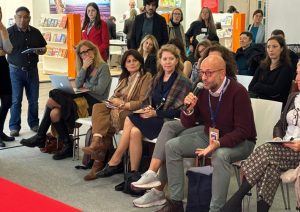Promoting Italian literature, as a conference confirms for translators at Frankfurter Buchmesse, is ‘a little magic, a lot of hard work.’
Praise for Italy’s Expanded Translation Support Program
At Frankfurter Buchmesse, Wednesday’s (October 16) Italian translators conference was held in person for the first time, buoyed by Italy’s stance as Frankfurt’s 2024 guest of honor market.
Organized by the Salone Internazionale del Libro di Torino, the event brought together Italian translators from several parts of the world in a special fellowship for this edition of Frankfurt, providing a networking opportunity.
Among the discussions at this Mediterranean-tinged morning session was a conversation about how to (better) export Italian books. Publishers of general literature from the United States (Michael Reynold, Europa Editions); Spain (Ana Rodado, Anagrama); Germany (Linus Guggenberger, Verlag Klaus Wagenbach); and France (Audrey Scarbel, Grasset) participated in the round table.
What may have been missing from the topic’s relevance was a diversity of literary genres represented. All the participating publishers agreed that a balance must be found between well-established Italian classics, like Umberto Eco, consistently performing well over the years, and newer works, which face more difficulty breaking into the various markets represented at the conference.
Michael Reynolds presented stark figures that underscore this challenge: “Of the 120 Italian titles by 42 different authors that we’ve translated in the United States,” he said, “only five have sold more than 100,000 copies, and three of those were by Elena Ferrante—while 55 of them have sold fewer than 1,000 copies.”
Nevertheless, one exception to this rule stands out: Come d’Aria, the debut and final novel by Ada d’Adamo, was published by the small press Elliott and posthumously awarded the 2023 Strega Prize. The book is set to be released in France next March.
“We don’t acquire titles because they’re successful,” said Audrey Scarbel. “We acquire them because we love them and they fit with our catalogue.”
“There’s certainly some magic in Italian literature,” said Linus Guggenberger, “but there’s also a great deal of work behind publishing in Germany, and that’s the most rewarding part of working in translation: talking with translators, who are almost like literary co-agents.”
As for Italy’s role as the guest of honor at this edition of the Frankfurt Book Fair, the attending publishers all noted that more than the spotlight on the country’s literature, it’s the translation subsidies that have accompanied this honor over the past year that will truly help develop Italian titles globally.
This represents a new and welcome initiative from Italy, which had not previously adopted an aggressive policy on translation support, it was said at the program.
Article courtesy of: Publishing Perspectives, Eric Dupuy: publishingperspectives.com
Photo: Publishing Perspectives, Eric Dupuy
